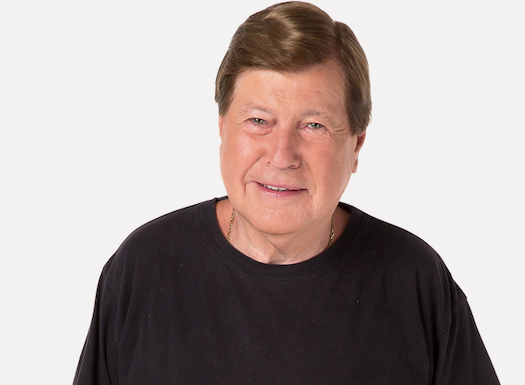David Penberthy and Will Goodings issued an apology from Nova and FIVEaa this morning following comments made by veteran broadcaster, Jeremy Cordeaux, over the weekend.
During his weekend breakfast show, Cordeaux called Brittany Higgins a “silly liitle girl who got drunk” and then continuing with remarks branded as appalling by saying, “If this girl has been raped, why hasn’t the guy who raped her been arrested? Apparently everyone knows his name.”
Nova and FIVEaa moved swiftly, terminating Cordeaux’s employment and then issuing an apology to Ms Higgins this morning.
David Penbenthy read out the apology saying, “Without reservation whatsoever, 5AA and Nova entertainment sincerely apologises to Brittany Higgins for the comments made by Jeremy Cordeux on 5AA weekend breakfast show.
“We acknowledge that the comments were completely inappropriate and offensive. Mr Cordeaux’s employment has been terminated and 5AA and Nova Entertainment have taken action to ensure this can never happen again.”
Ms Higgins said she is grateful to FiveAA and parent company Nova Entertainment for “standing up for the one in five Australian women who will experience sexual assault in their lifetime.” She repsonded on social media, saying:
“I politely disagree, Mr Cordeaux. I do not deserve to have my ‘bottom smacked’. This rhetoric isn’t helpful, especially given the cultural reckoning about consent that is taking place across the country.”
Subscribe to the radioinfo podcast on these platforms: Acast, Apple iTunes Podcasts, Podtail, Spotify, Google Podcasts, TuneIn, or wherever you get your podcasts.





This comment is about the law of consent that every person must be aware of, whether a broadcaster should be dismissed for making unacceptable comments and a comment about the word "appropriate".
First, this comment is not legal advice of the dismissed broadcaster NOR the alleged victim.
This is a lesson on how a broadcaster, who ever it may be when it comes to commenting on the law and alleged victims of ANY crime. It is not a political comment. I leave that to others.
The dismissed broadcaster addressing the alleged victim as "...a silly little girl who got drunk..." does not understand the meaning of "consent" within the criminal law.
To illustrate, section 61I of the "Crimes Act", NSW as at 20th October, 2020 says on sexual assault that "....Any person who has sexual intercourse with another person without the consent of the other person and who knows that the other person does not consent to the sexual intercourse is liable to imprisonment for 14 years......"
Ref: https://www.legislation.nsw.gov.au/view/whole/html/inforce/current/act-1900-040#sec.61I
The key word is consent and that it must be given freely and voluntarily. The Act does not enumerate the lack of consent. Case law has enumerated situations where there is no consent.
A person who is intoxicated, or as the broadcaster said "...drunk..." may well be incapable of giving consent.
Definitions of consent enumerated from case law and presented to the public are given at:
https://www.victimsservices.justice.nsw.gov.au/sexualassault/Pages/sexual_assault_victims.aspx#Commonly
See also:
Sexual consent tookit, rape and sexual assault research and advocacy.
https://rasara.org/consent-toolkit-home
Help and support lines for all states:
https://rasara.org/help-and-support
Other situations of non-consent include past sexual conduct of a victim, being flirty, being of service and being kind to people.
Anyway, if a person is incapable because of being in an intoxicated state or does not expressly give consent, then there is no consent.
Thus if there is no consent, then it may well be a case of sexual assault. To determine whether a sexual assault was done is first up to the victim to report to the police and the police to investigate the facts of the situation.
It irrelevant whether the victim reported the incident immediately or later. There are NO statute of limitations on criminal matters.
Therefore ANY presenter or ANY person in our society must understand the meaning of consent of a person being freely and voluntary given.
It is also important for ALL of us. Educational institutions, workplaces and other places where people meet and interact need to know the law and need to know how we BEHAVE.
For broadcasters, instead of attacking the victim, it would have been far more constructive for ANY broadcaster to discuss the meaning of consent in relations with others and our behaviour towards others. I particularly direct this to commercial broadcasters who may have a larger audience share than the ABC.
Should the broadcaster have been dismissed for calling the alleged victim "....a silly little girl who was drunk...."?
I am speculating here. In light of campaigns by concerned citizens boycotting the sponsors of a 2GB talk host resulting in decreased revenue from advertising, it may well have been a commercial decision of the dismissed broadcaster's employer.
The broadcasting entity may have been concerned that if the dismissed presenter continued to broadcast, then the employer may have been subject to boycotts of sponsors and a resulting drop in advertising revenue. Then it is speculation.
Therefore presenters must BEHAVE and invite constructive discussion on the issue of consent.
Unfortunately there hasn't been any campaigns to boycott sponsors whose presenter insults religious figures.
Finally I wish to criticise the use of the the word "inappropriate" by the employer when describing the type of comment by the dismissed broadcaster.
The word "inappropriate" connotes that it is suitable to do something in one situation and not suitable in another situation. IT IS NEVER APPROPRIATE TO CALL SOMEONE "...a silly little girl..."
IT IS UNACCEPTABLE TO MAKE SUCH COMMENTS NOT INAPPROPRIATE.
Thank you,
Anthony of Belfield